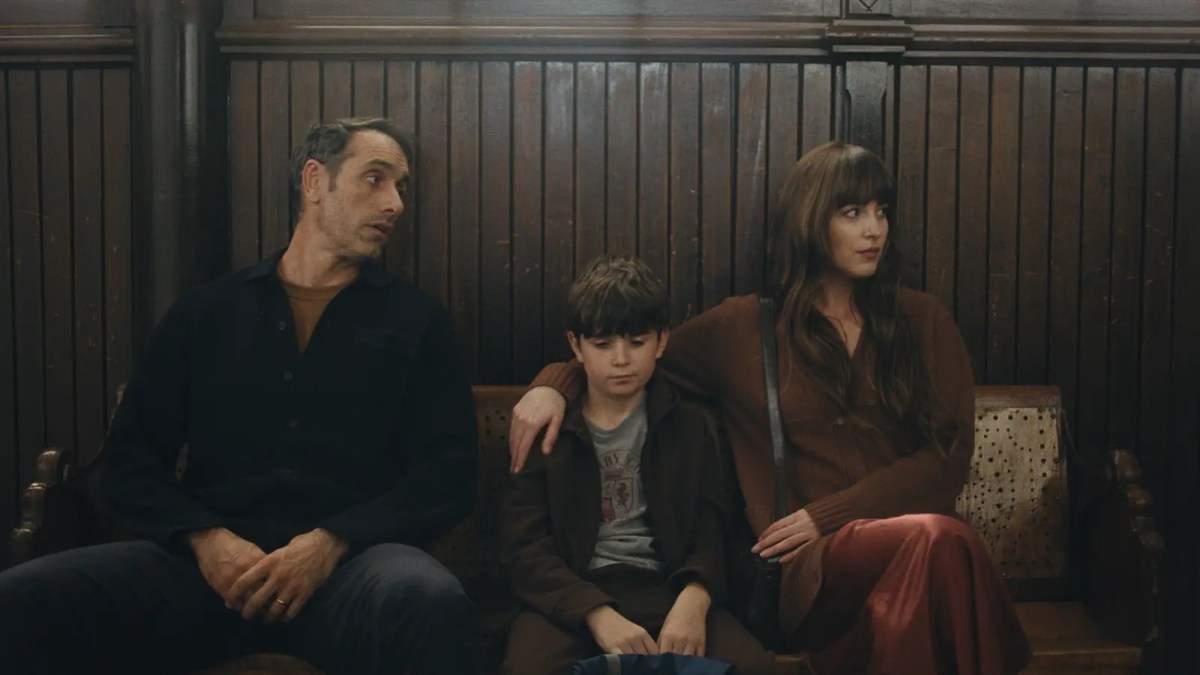Perhaps best described as a ‘screwball’, Splitsville is an under-the-radar romcom starring Dakota Johnson, Adria Arjona, Kyle Marvin and director Michael Angelo Covino in a wife-swap comedy of errors.
Ashley (Arjona) and Carey (Marvin) are a happy couple – or so Carey thinks. After they both witness a traumatic (and hilarious) event on the way to their friends’ lakehouse, Ashley reveals that she’s had the ick for a long time now, and she wants a divorce. The clueless Carey crashes out in a matter of seconds, subjecting himself to a torturous walk across asphalt highways and bramble-filled fields so that he can arrive at the lakehouse alone.
Despondent, Carey seeks advice from their friends – the happily married couple of Julie (Johnson) and Paul (Covino) and their son. Except, their marriage is not as happy as it seems, and they’ve been seeing other people in a mutually open arrangement for a year. Understanding this to be fair game, Carey sleeps with Julie (after some prolonged flirting). For Paul, this crosses a line, and the two men confront each other in a tightly choreographed, laugh-out-loud fight sequence.

Splitsville: quick links
This set up is the high point of the film, charging at the audience like a bull at a gate and laying out some of its best slapstick moments. What the film wants to be is clear: a modern, feminist take on the screwball comedy. But its tendency to lean towards a narrative of ‘who’s screwing who’ rather than romance makes it more akin to the 1970s sex comedy.
Watch the trailer for Splitsville.
Splitsville and sex comedies
The surplus of sex comedies in the 1970s had a number of obvious drivers: the growth of the ‘free love’ movement that started in the 60s, the continued reaction to a post-war conservative society, and the increase of education around sex for pleasure. The films were were aimed at an audience seeking more progressive and frank conversations around sex, and they were oh-so-titillating. They were also very sexist.
At the very least, Splitsville subverts this norm by never showing female genitalia onscreen – instead, it’s dongs galore as the lead couples give the polyamorous lifestyle a red hot go. The sex scenes themselves balance the goofy comedy and genuine sexiness quite well.
Disappointingly, the film leans into the stereotype that poly relationships work out better for women than for men. Very quickly Ashley amasses a harem of men (and one woman) who cannot bring themselves to leave her house. As a sight gag this works well, particularly when the dinner table keeps expanding as more and more dates join the roster. But it’s also reinforcing a particularly silly expectation, so it quickly wears thin.
Splitsville and stereotypes

Fulfilling another poly stereotype, both Carey and Paul cannot fully bring themselves to accept the conditions of the open marriage agreement, and continue to fester in jealous rage. Much of the film’s later gags are borne of this envious motif, and pretty soon it veers a little too close to ‘men are from Mars, women are from Venus’ territory.
Splitsville is written and directed by Michael Angelo Covino, who also stars in the film as Paul. And don’t get me wrong, there’s nothing inherently wrong with a director also acting in their own films. But this particular project I view with suspicion: Covino’s character is self-centred, focused on body image, and gets to sleep with both Dakota Johnson and Adria Arjona. The whole deal smacks of ‘vanity project’, and it’s not very endearing to the audience.
In trying to say something new about modern dating and relationship politics, Splitsville nearly 180s into sexist territory. To its credit though, it is touching on a particularly fresh and hot-button topic at a time when not many other films will even go there.
As a central thesis, Splitsville imagines a world where people can have better discussions about monogamy vs polyamory, and a society where children are raised by villages, not individuals. It’s a nice sentiment, but not one I’m fully convinced it sells.
Splitsville is in cinemas from 11 September.
Discover more screen, games & arts news and reviews on ScreenHub and ArtsHub. Sign up for our free ArtsHub and ScreenHub newsletters.
Actors:
Dakota Johnson, Adria Arjona, Michael Angelo Covino, Kyle Marvin
Director:
Michael Angelo Covino
Format: Movie
Country: USA
Release: 11 September 2025





